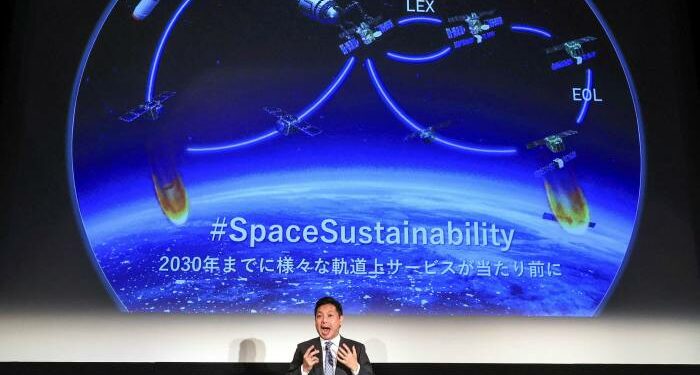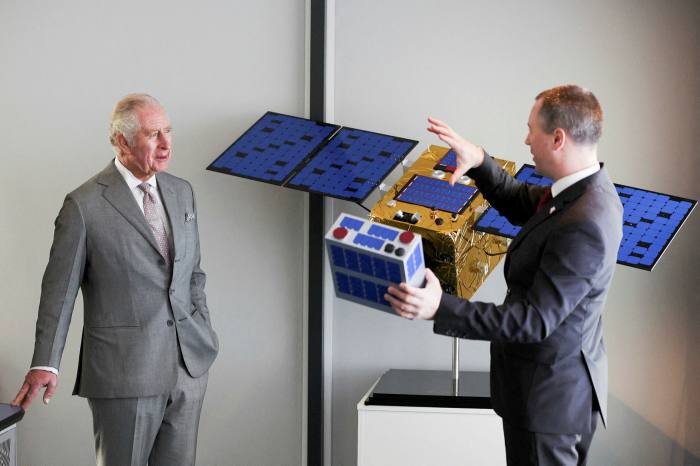When Nobu Okada founded his space debris removal start-up Astroscale, in 2013, there was little sense of alarm about the massive volume of material orbiting Earth — outside a small circle of experts.
Almost a decade later, junk accumulated from decades of space exploration and the ensuing environmental crisis are not only widely debated issues, but an increasing source of geopolitical tension between the world’s top superpowers with space ambitions.
For Astroscale and, more broadly, for Japan, debris removal provides a huge market opportunity to take the lead — both in developing the required technology, and in establishing regulation to govern the responsible use of space.
The space around Earth is littered with roughly 9,000 metric tonnes of debris, according to Nasa, which include abandoned satellites and other remains from disintegrating spacecraft.
Since 2019, the number of working satellites in orbit has also surged 50 per cent, sparking concerns that the growing volume of space debris could lead to potentially catastrophic collisions with these satellites — which will also become space junk at the end of their life.
While collisions are still rare, Okada warns that the number of near misses is increasing with the proliferation of satellites that are critical to society. These satellites provide real-time information on car traffic, weather, and financial markets, and are also vital for communication, Earth observation and monitoring climate change.
In 2020, spacecraft came within 1km of an object roughly 2,000 times a month. That number has tripled over the past year, according to Okada.
“It is only in space where there is a throwaway culture,” he says. “Space debris is troublesome because space — unlike air, land and sea — has no borders and therefore no rules to govern the countries [operating in it].”
With nations reluctant to take on the growing cost of removing space debris, Okada realised early on that there was room for the private sector to take on the clean-up mission by using new technology, while also helping to develop regulations on responsible space use.
According to Northern Sky Research, the market for in-orbit services, such as Astroscale’s debris removal, is projected to generate $14.3bn in revenue by 2031. Beyond clean-up, the aim of these services is to prevent the creation of new debris by helping satellites avoid collisions and extending their life through inspection and maintenance.
Okada’s start-up is uniquely positioned among a cluster of space start-ups that have emerged. While headquartered in Japan, it has subsidiaries in the UK, the US, Israel and Singapore. It has raised $300mn in funding from a mix of Japanese and international investors such as the Innovation Network Corporation of Japan — a government-backed fund — Nintendo’s family office, and Seraphim Space Investment Trust, the UK-listed SpaceTech fund.
“If this was a normal business, you would want to build your presence in one country and expand your market from there,” Okada says. “For this mission, our belief was that we needed to build our market presence worldwide in parallel with creating rules.”
Currently, there are no internationally agreed, legally binding regulations for space — the industry broadly follows guidelines for best practice to mitigate the creation of debris. However, as a member of many of the industry’s advisory panels, Okada is closely involved in discussions to compile new regulations.
Astroscale’s debris removal services are not yet in operation but it is working with the Japan Aerospace Exploration Agency (Jaxa) to launch an inspection satellite next year on the upper stage of a Japanese rocket body. This will obtain images and other data to analyse the debris environment.
The company is also developing a vehicle capable of inspecting, docking and removing satellites from orbit when they reach the end of their life. The dead satellite and the vehicle itself burn up once they re-enter Earth’s atmosphere. The European Space Agency and the UK Space Agency are funding its first mission, planned for 2024.
To create globally enforceable rules for more responsible space use, the clean-up technology needs to be ready, says Okada. “If there is no solution, people won’t know how to regulate”.
Toru Yamamoto, a senior researcher at Jaxa, says until the technology is developed, the debate on whose responsibility it is to clear up debris cannot move forward. “Currently, technology is the bottleneck,” says Yamamoto. “Japan’s technology in debris removal is at a very high level so we [first] need to demonstrate best practice.”
For Japan, which is also responsible for producing some of the debris, its involvement is driven by a fear that it will be forced to shoulder the costs of debris removal without having a say in setting the rules. “If we don’t do these kinds of activities, we won’t have any voice as a nation and we could just be paying the fees,” Yamamoto adds.
For now, Astroscale’s goal is to offer debris removal services on a routine basis by 2030 — when the UN’s Sustainable Development Goals to meet targets including climate change, education and poverty are to be implemented.
“If we are to ensure the Earth’s sustainable development, then we must guarantee the sustainable use of space,” says Okada.












